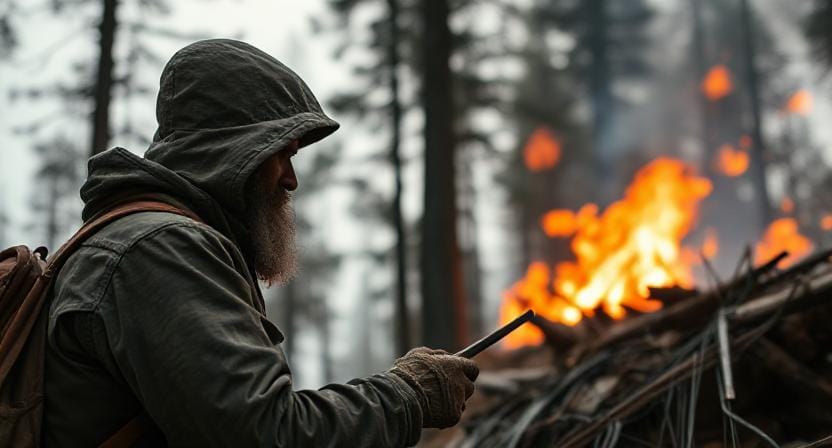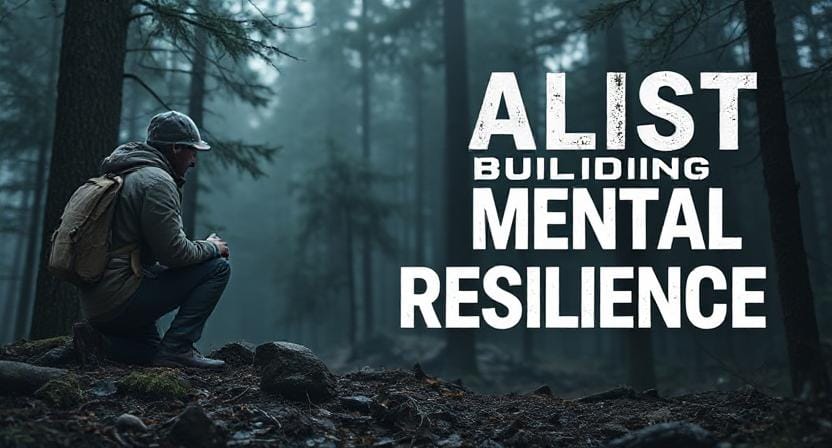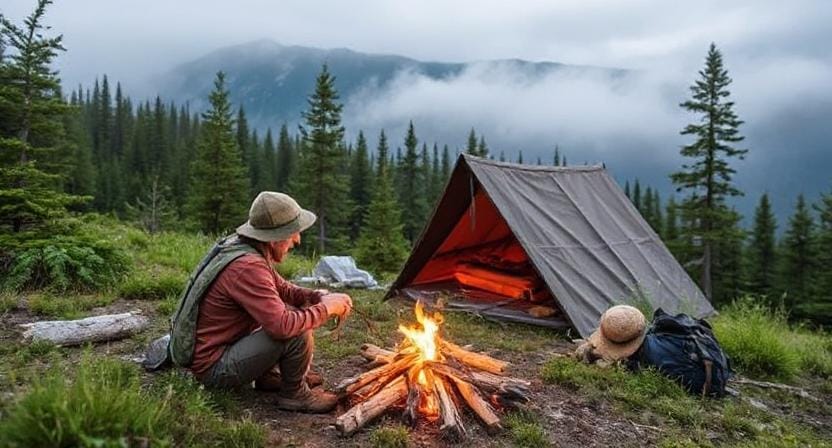Last Updated on November 1, 2025 by Kevin Collier

Top Takeaways and Key Concepts
- Stay calm by taking slow, deep breaths to clear mental fog.
- Accept your situation honestly to make practical, realistic decisions.
- Build resilience through small daily goals and gratitude practice.
- Visualize success in survival tasks to boost focus and confidence.
- Spend time in nature daily to reduce stress and restore clarity.
Picture this: you're in the woods, and the trees around you look like they've been there forever. It seems beautiful when the birds sing. You neglected to pack your favorite snack, though.
It feels extremely awful at first. No granola bars with chocolate on them? Oh no! But wait a second. If you're trying to stay alive for a long time, missing a snack is not a big deal. What do you do if you're cold or thirsty?
Please Note: This post may contain affiliate links. If you click one of them, we may receive a commission at no extra cost to you. As an Amazon Associate, I earn from qualifying purchases.
So, how do we prepare our minds for hard times? Let's talk about some simple strategies to keep sharp and focused when things get a little chaotic.
It's very vital to stay calm. It helps to take deep breaths. Take a deep breath in and then let it out. Do this a few times. It's like hitting the reset button on your brain. It truly helps get rid of the fog.
You might want to think about what you want to do. Think about the fundamentals, such how to get food, create a shelter, and get water. You can write them down or remember them. Having a plan makes things seem less terrifying.
It can also help to picture things. Think about how nice it would be to locate safe water or stay warm in a shelter. Picture it in your head. It's quite strong. It seems more likely because your brain starts to believe it.
Another fun hint? Have fun with it! Make it a scavenger hunt when you're out and about. Search for animal trails or flora that catch your eye. You suddenly have a lot to do and are learning at the same time. It keeps your mind busy.
It also helps to talk to yourself. Does that seem silly? Maybe a little. But expressing words like “I'm safe” or “I can do this” truly helps you feel better about yourself. It's like rooting for oneself in a silent way.
Don't forget to take short rests, too. Let your mind go. Listen to the sounds of nature. It's quite relaxing to hear those wonderful birds chirping and the leaves rustling.
*** Shop for Survival Gear - Tools - Kits ***
Survival Gear - Bags and Backpacks - Knives - Boots/Footwear - Communication
Outdoor Cooking - Gloves - Hydration - Dry Boxes - Water Filtration Systems
Tents - Sleeping Bags - First Aid Kits - Multi-Tools - Flashlights - Fire Starters
Navigation - Survival Food - Night Vision - Headlamps - Stun Guns - Binoculars
You can do this. Being ready and having a good attitude may make a big difference, even when things go tough. No matter what happens, you'll be ready for the next adventure!
Accepting Reality: The First Step to Survival

First things first—acceptance is key. I know it sounds a bit like something you'd hear at a self-help seminar led by a motivational cat poster, but hear me out!
When you're in a survival situation, denial can be as dangerous as trying to outrun a bear (spoiler alert: don’t). Acknowledging that you're in a challenging environment allows you to assess your situation honestly.
For instance, during one camping trip gone awry (thanks again, Uncle Bob), I found myself lost after taking what I thought was “the scenic route.”
Instead of panicking about my impending doom or blaming my uncle for leading me astray (okay, maybe just a little), I had to accept reality.
Once I did that, it became easier to make decisions about shelter and food instead of wallowing in despair like an abandoned puppy.
By embracing the truth of your circumstances—no matter how grim—you open yourself up to realistic solutions rather than getting stuck in the mud of wishful thinking.
Building Mental Resilience

Let's be honest: life isn't always perfect, especially when you're stuck in the mud trying to build an emergency shelter. This is where mental toughness comes in. Think of resilience as your emotional armor; it helps you deal with the stress and setbacks that come with trying to survive.
Start small to build this mental strength. Every day, try to make goals that you can reach. For example, you may learn how to build a fire without matches or find plants that you can eat (dandelions are not simply weeds!). Every time you succeed, you'll feel more confident and ready for harder tasks in the future.
It's interesting that studies suggest that people who are thankful tend to become more resilient over time. So, even if you're huddled under a makeshift shelter, take a moment each day to enjoy the little things, like still having both feet or finding that last granola bar in your rucksack!
Methods of Visualization
Here's something fun: visualization isn't just for athletes who want to win gold medals. It's also quite helpful for anyone who is getting ready for a long-term survival crisis! You can set yourself up for success by seeing yourself getting through problems before they happen.
Think about the abilities you'll need, like how to make clean water or build a shelter, and see yourself doing them perfectly. Think about how proud you'll feel when you do these activities. Picture yourself drinking clean water from your homemade filter system (which may or may not require socks).
I remember learning this skill before I went on my first solo hike. While other people were worried about bears attacking their tents or running out of snacks (again!), I was preoccupied imagining myself triumphantly cooking marshmallows over an open fire after successfully gathered kindling. Spoiler alert: no bears were involved!
Learning to Be Patient
In today's world, where everything is available right away, such microwave dinners that are ready in minutes and movies that can be streamed with just one click, it's easy to forget that patience is important in survival situations. Believe me, nothing tries your patience like waiting for water purification tablets to function while you watch dirty pond water!
When things get tough, remember that good things take time. This is true even if “good” means locating safe drinking water or figuring out which berries won't poison you faster than poor sushi from last Friday night's dinner special.
Fishing is one of the outdoor sports that has taught me to be patient (yeah, sometimes it feels more like waiting). Sitting calmly by the riverbed teaches us important lessons about timing and not giving up. It also gives us excellent stories about “the one that got away.”
Staying Connected with Nature

Finally—and perhaps most importantly—stay connected with nature during long-term survival scenarios! It sounds cliché because everyone loves saying things like “nature heals,” but guess what? It actually does! Being outside can reduce stress levels significantly and help clear mental fog caused by anxiety.
Take time each day—even if it's just five minutes—to observe what's around you: listen closely as birds chirp their morning songs or watch ants march across the ground carrying crumbs larger than themselves (seriously—they're impressive!).
Isn't it lovely to spend time in nature? It makes you feel like you're part of everything around you. There is a large, wonderful world out there, and we are all a part of it. Nature is a quiet reminder that we are just one part of a much broader puzzle when life seems loud or too much to handle.
I've had my fair share of problems outside. Like the time I fell while trekking up a hill because my shoelaces got in the way. What a mess! Not my best moment, that's for sure. But you know what? I still saw beauty in the tiny things, like a butterfly dancing by or the sound of leaves rustling in the breeze, even when I was clumsy.
Nature always has something to show us if we take a stop and look closely. A little ant carrying a piece of food or sunlight coming through the branches. Everything is very beautiful. These tiny things may make every mistake into something memorable.
Remembering to be thankful for the little things might change your mood. If you're feeling anxious or stuck, go outside for a minute. Listen to the birds sing or feel the wind. It can be like a little reset.
Nature also teaches us to be patient. You might have to wait for a flower to bloom or a sunset to be gorgeous. That's fine; life isn't always swift. It's so nice to see things flourish, even if it takes a while.
What do you think is great? No matter if it's a busy park or a lonely woodland, everyone may find their own personal place in nature. You just have to be ready for it. Nature is kind and friendly, and it's always ready to share its charm with us when we go outside.
So, even on the crazy days when you trip or fall, whether it's real or not, simply take a breath. Take a look around. There are so many amazing things to see. Being in nature lets us breathe and reconnect. We are all part of something large and wonderful, and that feeling can make even the darkest days brighter.
Frequently Asked Questions
Why is staying calm important in long-term survival?
Staying calm helps clear mental fog, reduces panic, and supports clear, rational decision-making under stress.
How does accepting your situation help survival?
Acceptance allows you to focus on realistic solutions instead of wasting energy on denial or fear-based thinking.
What daily habits help build mental resilience?
Small daily goals and gratitude practices strengthen emotional stability and reinforce confidence over time.
How can visualization improve survival mindset?
Visualizing successful outcomes primes your mind for confidence and increases your ability to perform survival tasks efficiently.
Why is patience necessary in long-term survival?
Many survival tasks take time, so patience prevents frustration and promotes steady focus while waiting on results.
Does spending time in nature really help reduce stress?
Yes. Nature exposure lowers stress hormones, calms anxiety, and helps restore mental clarity and emotional balance.
How do positive self-affirmations help during hard situations?
Positive self-talk reinforces confidence and shifts your mindset toward capability rather than fear or self-doubt.
Suggested Resources:
Survival Mindset
https://www.survivaltips.com/survival-mindset
Mental Resilience Training
https://www.psychologytoday.com/us/blog/mental-resilience-training
Building Emotional Strength
https://www.mindtools.com/articles/emotional-strength.htm

Kevin Collier is a seasoned survivalist and expert in prepping and homesteading, contributing to WiseSurvive.com. With a deep-rooted passion for self-sufficiency and outdoor survival skills, Kevin shares practical advice, strategies, and resources to help individuals prepare for any challenge. His informative articles cover a range of topics, from essential survival techniques to sustainable living practices, empowering readers to thrive in any situation. Whether you're a novice or a seasoned prepper, Kevin's insights will inspire you to take charge of your readiness and build resilience for the future.




